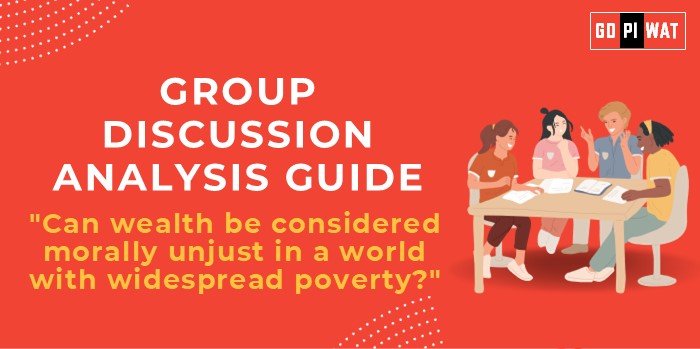📋 Group Discussion (GD) Analysis Guide: Can Wealth Be Considered Morally Unjust in a World with Widespread Poverty?
🌐 Introduction to the Topic
Opening Context: In a world where extreme wealth and abject poverty coexist, the morality of wealth raises complex questions about equity, responsibility, and ethics. For future leaders, understanding these dynamics is essential for navigating real-world challenges.
Topic Background: The topic explores ethical frameworks like utilitarianism, socialism, and libertarianism to assess whether accumulating wealth can be justified amid global poverty. Discussions around this theme often reference disparities in wealth distribution, policy implications, and individual responsibility.
📊 Quick Facts and Key Statistics
- Global Wealth Disparity: Top 1% hold 45.6% of global wealth (2023, Credit Suisse).
- Extreme Poverty: 9.2% of the world lives on less than $2.15/day (World Bank, 2022).
- Philanthropy Impact: $810 billion donated globally in 2022 (CAF).
- Tax Inequities: Billionaires pay an average effective tax rate of 8% in the US (White House, 2023).
🔑 Stakeholders and Their Roles
- Governments: Formulate tax policies and social welfare programs.
- Corporations: Influence wealth distribution via wages and corporate social responsibility (CSR).
- Wealthy Individuals: Philanthropic contributions and ethical business practices.
- Non-Governmental Organizations (NGOs): Address poverty through targeted interventions.
🌟 Achievements and Challenges
Achievements
- Philanthropy: Initiatives like The Giving Pledge have committed over $600 billion.
- Economic Upliftment: Microfinance programs in South Asia lifted millions out of poverty.
- CSR Models: Companies like Patagonia balance profits and social impact.
Challenges
- Wealth Concentration: Persistent inequality despite economic growth.
- Ethical Concerns: Wealth accumulation often linked to exploitative practices.
- Policy Limitations: Global tax evasion undermines redistribution efforts.
Global Comparisons
- Nordic Countries: Low poverty rates due to progressive taxation and welfare.
- US Wealth Gap: Income inequality highest among developed nations.
Case Study
Bill Gates: The Gates Foundation’s focus on global health has significantly impacted malaria eradication but has drawn criticism for wealth concentration.
📚 Structured Arguments for Discussion
- Supporting Stance: “Wealth, when used responsibly through philanthropy and innovation, can address systemic poverty and uplift millions.”
- Opposing Stance: “Concentrated wealth is morally unjust as it perpetuates inequality and power imbalances in society.”
- Balanced Perspective: “While wealth can drive positive change, its accumulation raises moral questions in the absence of systemic equity.”
💡 Effective Discussion Approaches
- Opening Approaches:
- Statistical Impact: “With 9.2% of the global population in extreme poverty, the ethical implications of wealth concentration become critical.”
- Historical Context: “From feudal lords to modern billionaires, history reflects a persistent question: can wealth coexist with fairness?”
- Counter-Argument Handling:
- Highlight inequities exacerbated by tax evasion and underpaid labor.
- Stress the need for systemic change rather than reliance on philanthropy alone.
📈 Strategic Analysis of Strengths and Weaknesses
Strengths
- Wealth drives economic development.
- Philanthropy addresses urgent social issues.
Weaknesses
- Moral conflicts in wealth accumulation.
- Inefficient wealth redistribution systems.
Opportunities
- Policy reforms for equitable taxation.
- Collaboration between public and private sectors.
Threats
- Growing resentment and social unrest.
- Exploitative wealth-generation practices.
🔗 Connecting with B-School Applications
- Real-World Applications:
- Finance: Ethical investment strategies.
- Operations: CSR-driven supply chains.
- Development: Inclusive growth policies.
- Sample Interview Questions:
- “Can taxation bridge the gap between wealth and poverty?”
- “Evaluate the ethical implications of billionaires in modern society.”
- Insights for B-School Students:
- Explore CSR in wealth management.
- Examine policies for reducing inequality in emerging economies.


